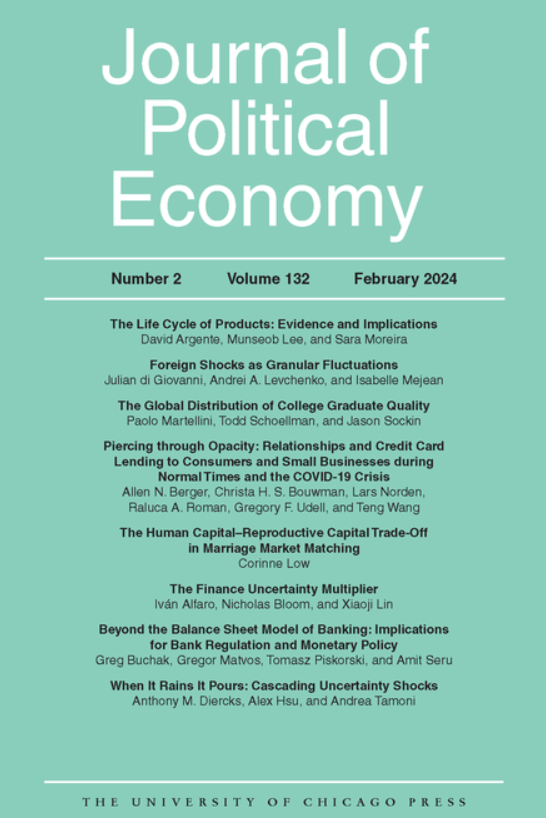临床试验经费和药物疗效报告
IF 6.9
1区 经济学
Q1 ECONOMICS
引用次数: 2
摘要
临床试验是药品审批的关键因素,同时也影响着处方决定。近年来,越来越多的临床试验是由制药公司而非公共部门资助的。本文估算了资金赞助对药物疗效报告的影响,利用了由不同经济利益方进行的不同随机对照试验通常会对完全相同的几组药物进行比较这一洞察力。原则上,比较相同药物的随机对照试验应得出可比的估计值,而与试验资助方的利益无关。在实践中,我利用新收集的数百项精神科临床试验的数据估算出,当试验由药物制造商赞助时,与没有药物制造商参与的相同试验中的相同药物相比,药物的疗效要高出 0.15 个标准差。试验设计和患者入组的可观察特征几乎无法解释这种效应。与此相反,受赞助的论文中出现非阳性结果时,未发表的可能性更大。回溯计算表明,这种发表机制可以解释近一半的赞助效应。随着预注册要求的实施,赞助效应会随着时间的推移而降低,这表明预注册可能有效地克服了赞助偏差,但这并不是决定性的。∗我非常感谢 Amy Finkelstein、Heidi Williams 和 Jim Poterba 提供的宝贵建议和指导。我还要特别感谢 Pierre Azoulay、Jonathan Gruber、Frank Schilbach 和 Scott Stern 提供的有益意见和支持。与 Sarah Abraham、David Autor、Ivan Badinski、Jane Choi、Joe Doyle、Colin Gray、Ryan Hill、Allan Hsiao、Simon Jaeger、Madeline Mckelway、Parinitha Sastry、Cory Smith、Carolyn Stein、Sean Wang、Michael Wong 以及几位匿名临床试验经理的讨论也使本文受益匪浅。Audrey Pettigrew 提供了出色的研究协助。本材料基于美国国家老龄化研究所(National Institute on Aging)(拨款号:T32-AG000186)和美国国家科学基金会研究生奖学金计划(National Science Foundation Graduate Fellowship Program)(拨款号:1122374)的资助。†麻省理工学院经济系。电子邮件:oostrom@mit.edu本文章由计算机程序翻译,如有差异,请以英文原文为准。
Funding of Clinical Trials and Reported Drug Efficacy
Clinical trials are a key determinant of drug approvals and also influence prescription decisions. In recent years, an increasing share of clinical trials have been funded by pharmaceutical firms, as opposed to by the public sector. This paper estimates the effect of financial sponsorship on reported drug efficacy, leveraging the insight that the exact same sets of drugs are often compared in different randomized control trials conducted by parties with different financial interests. In principle, randomized control trials comparing the same drugs should yield comparable estimates, regardless of the interests of the trial’s funders. In practice, I use newly assembled data on hundreds of psychiatric clinical trials to estimate that a drug appears 0.15 standard deviations more effective when the trial is sponsored by that drug’s manufacturer, compared with the same drug in the same trial without the drug manufacturer’s involvement. Observable characteristics of trial design and patient enrollment explain little of this effect. In contrast, sponsored papers with non-positive results are more likely to remain unpublished. Back-of-the-envelope calculations suggest this publication mechanism can account for nearly half of the sponsorship effect. The sponsorship effect decreases over time as pre-registration requirements were implemented, which is suggestive, though not definitive, that pre-registration may be effective in overcoming sponsorship bias. ∗I am very grateful to Amy Finkelstein, Heidi Williams, and Jim Poterba for their invaluable advice and guidance. I would like to extend a special thanks to Pierre Azoulay, Jonathan Gruber, Frank Schilbach, and Scott Stern for helpful comments and support. This paper also benefited greatly from discussions with Sarah Abraham, David Autor, Ivan Badinski, Jane Choi, Joe Doyle, Colin Gray, Ryan Hill, Allan Hsiao, Simon Jaeger, Madeline Mckelway, Parinitha Sastry, Cory Smith, Carolyn Stein, Sean Wang, Michael Wong, and several anonymous clinical trial managers. Audrey Pettigrew provided excellent research assistance. This material is based upon work supported by the National Institute on Aging under Grant Number T32-AG000186 and the National Science Foundation Graduate Fellowship Program under Grant Number 1122374. †MIT Department of Economics. Email: oostrom@mit.edu
求助全文
通过发布文献求助,成功后即可免费获取论文全文。
去求助
来源期刊

Journal of Political Economy
ECONOMICS-
CiteScore
15.20
自引率
2.40%
发文量
134
期刊介绍:
Established in 1892, the Journal of Political Economy (JPE) stands as one of the oldest and most esteemed journals in economics. It showcases significant research and scholarship in economic theory and practice, with a focus on publishing highly selective, widely cited articles of current relevance. JPE's analytical, interpretive, and empirical studies cover diverse areas such as monetary theory, fiscal policy, labor economics, development, micro- and macroeconomic theory, international trade and finance, industrial organization, and social economics. Essential reading for economists seeking to stay abreast of groundbreaking research in the field.
 求助内容:
求助内容: 应助结果提醒方式:
应助结果提醒方式:


